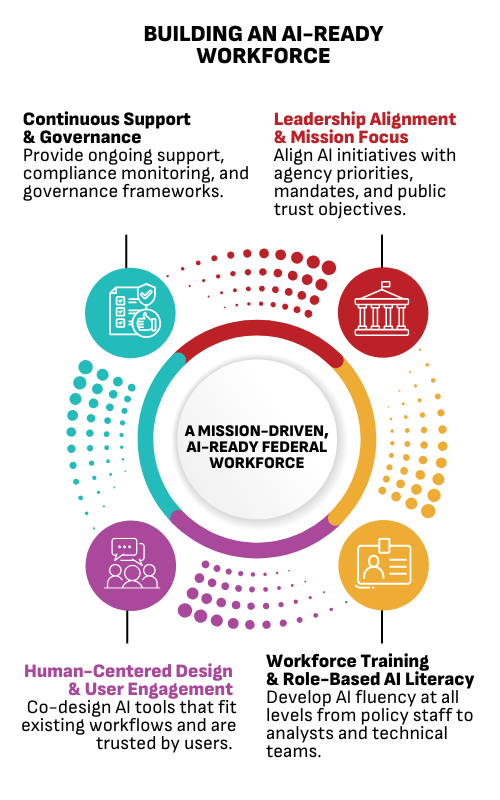Abt’s Approach to Practical AI Adoption for Government
From the fringes of policy discussions, artificial intelligence (AI) has moved to a core priority for federal agencies. (In the private sector, the momentum is even clearer: McKinsey’s 2025 State of AI report found over 75% of organizations report using AI in at least one business function.) As AI becomes embedded across industries, the public sector has a window—and responsibility—to adopt these technologies in ways that enhance mission outcomes and public service. The challenge? Many AI initiatives fail due to poor adoption, governance gaps, and lack of human oversight.
AI That’s Built to Deliver, Not Disrupt


Federal AI initiatives promise efficiency and innovation. But without a clear strategy, these projects can introduce complexity rather than streamline operations. AI isn’t just about automation: It’s about making better decisions faster, reducing administrative burdens, and enhancing human expertise. Success hinges on how well agencies implement and integrate AI into existing workflows, governance structures, and workforce strategies.
Abt helps federal teams move past AI hype to solutions that work in real-world settings. Our AI advisory services focus on adoption, risk management, decision-making support, and workforce transformation so agencies see tangible benefits from AI investments.
Making AI Work for People, Not the Other Way Around
AI initiatives often fail because they’re not designed for the people who need to use them. When staff resist new systems or don’t trust automated decision-making, AI adoption stalls. Abt’s approach ensures agencies don’t just deploy AI—they integrate it into how teams work every day. Our structured change management methodology, supported by subject matter expertise and a dedicated user engagement team, seamlessly embeds AI solutions into existing processes. This strategy drives adoption by ensuring the tools complement workflows rather than disrupt them, and that staff feel confident using AI to enhance their decisions.
Client: Centers for Medicare and Medicaid Services (CMS)
Challenge: CMS receives data submissions from State Medicaid agencies about their managed care programs. These reports, often in PDFs and Excel spreadsheets, made it difficult for CMS staff to summarize findings or quickly identify data quality and completeness issues.
Solution: Partnering with internal CMS data experts and Abt’s Medicaid policy specialists, we automated the data quality control process. Using AI tools within a Databricks warehouse, Abt streamlined data ingestion, automated validation, and surfaced trends across states for further review.
Impact: CMS now uses interactive internal dashboards that automatically update with accurate, quality-controlled data, enabling faster, more informed decision-making. Abt’s AI algorithms not only flag data inconsistencies but also highlight emerging trends for human-in-the-loop review. The result is a modernized, efficient process that improves data usability while keeping CMS staff as key decision-makers.
Governance and Risk: Managing AI Responsibly
Without transparency and accountability, AI can misinterpret data or create security risks. Abt integrates AI governance frameworks to ensure solutions are measurable, explainable, and continuously monitored.
Client: U.S. Department of Justice (DOJ), Bureau of Justice Statistics (BJS)
Challenge: BJS needed a unified method to measure and track misdemeanor charges at the federal level. However, states have varying laws and legal definitions for misdemeanors, making it difficult to create a consistent framework. BJS required a comprehensive crosswalk to map state-level misdemeanor charges to federal-level categories.
Solution: While BJS was open to leveraging generative AI for this task, they emphasized the need for reliability and transparency. Abt proposed a governance-first strategy, recreating an existing felony-level crosswalk that was previously developed by Subject Matter Experts, as a proof of concept to validate the accuracy and trustworthiness of the generative AI approach. Abt then fine-tuned an out-of-the-box GenAI model to replicate the human-developed felony charge crosswalk.
Impact: The AI-enabled process accurately replicated the mapping in just 20% of the previous time. It also uncovered areas of potential error in the human-generated crosswalk. This increased BJS’s confidence in using AI to support development of their misdemeanor charge crosswalk—delivering a faster, more accurate, and scalable solution while maintaining rigorous governance standards.
The Workforce Challenge: Preparing Federal Teams for AI Adoption
Even the best AI solutions fail without a trained workforce to implement them. A common pitfall in AI adoption is overestimating technology’s capabilities while underestimating the need for organizational change.
A recent study found only 2% of firms are prepared for large-scale AI adoption—a significant readiness challenge across sectors.
Abt trains and supports federal teams so that AI adoption empowers rather than disrupts. Our structured change-management approach includes leadership coaching to ensure senior officials understand how to evaluate and use AI-driven insights, workforce training programs that help teams integrate AI into day-to-day operations, and iterative implementation models for staff to test and refine AI tools before full deployment.
Client: Substance Abuse and Mental Health Services Administration (SAMHSA)
Challenge: Community-Based Organizations (CBOs) that partner with SAMHSA to deliver substance abuse and mental health treatment often rely on outdated technology and inefficient workflows. These limitations hinder their ability to leverage innovative tools, including GenAI, to enhance service delivery.
Solution: Abt prepared training materials for an in-person multi-day training for 30 CBOs on how to integrate generative AI into their workflows, including prompt engineering, AI ethics, and best practices for applying AI in behavioral health settings. We also established an ongoing peer learning network for organizations to share tips with each other.
Results/Impact: This initiative empowered frontline case workers, social workers, and outreach specialists with practical skills in AI for behavioral health services, while fostering a collaborative learning environment for continuous improvement.
AI That Works for Citizens, Not Against Them
AI is not a one-size-fits-all solution. Federal agencies need AI strategies tailored to their mission, workforce, and operational goals. By focusing on practical implementation, risk management, and workforce readiness, Abt ensures that AI enables of smarter, more efficient governance.
For agencies looking to move beyond AI pilots and into measurable impact on citizen services, the path forward isn’t just about new technology—it’s about structured implementation, continuous oversight, and workforce transformation.
That’s the kind of AI that delivers.
Read More
Data Science, Analytics & Artificial Intelligence

Agentic AI for Citizen-Centered Services
Agentic AI helps federal agencies deliver faster, simpler, and more secure citizen services—driving real mission outcomes at scale.

AI-Driven Efficiency in Public Service: A Q&A with Nora Connor
Government agencies can use artificial intelligence to make better decisions and be more efficient while using Abt’s tools to mitigate risk.

Spotlight On: Primary Care
Abt’s experts partner with federal agencies, states, and other organizations to advance evidence-based primary care in the U.S.
Regions
- North America
